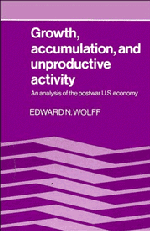Book contents
- Frontmatter
- Contents
- Preface
- 1 Introduction
- 2 Unproductive activity in a capitalist society
- 3 A Marxian accounting framework
- 4 A growth model of accumulation and unproductive labor
- 5 Rise of unproductive activity in postwar economy
- 6 Absorption of labor and capital and rate of surplus value
- 7 Absorption of new resources and growth in real income
- 8 Conclusions and speculations
- Appendix: Data sources and methods
- References
- Index
5 - Rise of unproductive activity in postwar economy
Published online by Cambridge University Press: 24 March 2010
- Frontmatter
- Contents
- Preface
- 1 Introduction
- 2 Unproductive activity in a capitalist society
- 3 A Marxian accounting framework
- 4 A growth model of accumulation and unproductive labor
- 5 Rise of unproductive activity in postwar economy
- 6 Absorption of labor and capital and rate of surplus value
- 7 Absorption of new resources and growth in real income
- 8 Conclusions and speculations
- Appendix: Data sources and methods
- References
- Index
Summary
More than half the taxes sent to Washington, Americans feel, are wasted, according to the Gallup Poll.
Democrats, Republicans, men, women, young, old and those of all income levels responded with unusual unanimity to the question, “Of every tax dollar that goes to the Federal Government in Washington, D.C., how many cents of each dollar would you say are wasted?”
Fifty-two cents was their median and most frequent response.
The results were close to those in a poll taken in 1978 that indicated that the American public felt that 48 percent of Federal tax money was wasted.
As in the 1978 survey, the latest poll indicated that the people believed that less money was wasted at the state and local levels than by the Federal Government. At the state level, they think that 29 cents of every tax dollar are wasted, according to the survey. The figure was 32 cents in 1978. At the local level, the figure was 23 cents in the latest poll and 25 cents in 1978.
(New York Times, December 17, 1979, p. A24. Copyright © 1979 by the New York Times Company. Reprinted by permission.)In this and the next two chapters, empirical results are presented to document the scope of unproductive activity in the U.S. economy in the postwar period and to demonstrate its effects on capital accumulation and the growth in productivity, the real wage, and per capita consumption.
- Type
- Chapter
- Information
- Growth, Accumulation, and Unproductive ActivityAn Analysis of the Postwar US Economy, pp. 104 - 120Publisher: Cambridge University PressPrint publication year: 1986
- 2
- Cited by



